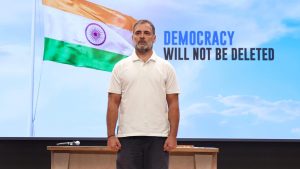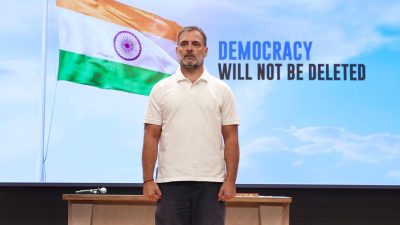It was a quiet Saturday on April 15, five days after Kulbhushan Jadhav had been sentenced by the Pakistan’s military court, when the Indian High Commission in Islamabad sent an SOS to South Block. The message: No one in the Pakistan court was willing to lawyer the case as the Lahore High Court Bar Association had told lawyers against accepting the brief, the bar chief having warned them that whoever did so would have his membership cancelled.

“Until then, we were exploring legal options in Pakistan’s judicial system, from filing an appeal in the military court to approaching the Pakistan’s civil courts — either by the Indian government or Jadhav’s family or human rights activists or organisations. But that option seemed remote after the lawyers’ association decision,” a top source told The Indian Express.
Story continues below this ad
Pressure was on South Block officials, as External Affairs Minister Sushma Swaraj had told Parliament earlier that week, on April 11, that the government will “go out of the way” to ensure justice for “son of India” Jadhav. Leading to India’s decision to approach the International Court of Justice were a series of meetings and events, and planning.
The meetings had started on April 10, at various levels, and options were tossed around through the week. Almost every scenario had been thought through when India realised on April 15 that it would be difficult to get a lawyer for Jadhav.
So, officials were asked to exercise all available diplomatic options so that a case could be built for approaching the ICJ. On April 19, foreign secretary S Jaishankar summoned Pakistan envoy Abdul Basit to provide certified copies of the chargesheet, proceedings of the Court of Inquiry, the judgment and the summary of evidence; provide the procedure for appeal to the relevant court; facilitate the appointment of a defence lawyer; provide a certified copy of medical report; issue visas to members of the family.
Meanwhile, the defence adviser at the Indian High Commission in Islamabad, Brigadier Arvind Bhatia, and his team were asked to get a sense of things from the Pakistan military. Around April 20, Bhatia told South Block that the Pakistan Army spokesperson, Major General Asif Ghafoor, had told Pakistan media there was “no chance” of the verdict on Jadhav being “overturned” since it was based on “incontrovertible evidence”.
Story continues below this ad
This reflected the hardening of the Pakistan military’s position on Jadhav, who had been so far denied consular access. The defence adviser and his team suggested there was no point appealing since the appellate court would be headed by a two-star general — junior to Pakistan Army chief Qamar Javed Bajwa and, therefore, unlikely to give a decision contrary to what the chief had already approved.
As the pressure built up, so did the Indian establishment’s worries. While Indian diplomats told top echelons of the government that Pakistan was unlikely to execute Jadhav as they perceived him as a “leverage” for them, many in Delhi worried that they should not take that for granted.
Over the next few days, the government asked for consular access again and got Jadhav’s mother Avanti to file a mercy petition, as well as visas for travelling to Pakistan. Indian high commissioner Gautam Bambawale handed over, on April 26, the appeal and the petition to Pakistan foreign secretary Tehmina Janjua. The following day, Sushma wrote to her Pakistan counterpart, Sartaj Aziz, requesting his personal intervention in visas and the mother’s petition.
Within days, the fault-lines between the Pakistan Army and the Nawaz Sharif-led civilian government became apparent, as the Pakistan Army spokesperson rejected a government notification on April 29 following the Dawn leaks probe.
Story continues below this ad
Some in New Delhi read this as a sign of “unpredictability” within Pakistan’s power structures and were apprehensive that Jadhav may become the victim of the strained relationship between the Army and the civilian government. It did not help that around that time bodies of two Indian soldiers were brutally mutilated, allegedly by Pakistan Army personnel.
It was under such circumstances that in early May, South Block finally decided to go to the ICJ, since the appeal period for Jadhav was due to end on May 19. The fact that Pakistan had not given consular access despite 16 requests made India’s case stronger, since Delhi was primarily invoking a violation of the Vienna Convention on Consular Relations for approaching the ICJ.
With May 19 as deadline, a team of officials set to work. Joint secretary (Pakistan, Afghanistan and Iran) Deepak Mittal and director Vinod Jacob were among the key drafters of the petition, with help from Indian envoy Gautam Bambawale. They consulted the external affairs ministry’s in-house legal and treaties division expert, V D Sharma, for drafting the petition. Harish Salve was roped in to fight the case because of his reputation in international legal circles.
All of them are known to have a way with words. Bambawale and Jacob have dealt with Indian joint statements with China and Pakistan in the past — Bambawale was joint secretary in-charge of China for more than three years while Jacob has served at Permanent Mission at the UN in New York as well Indian embassy in China as political counsellor. Mittal, who has been a low-profile diplomat, was part of Narendra Modi’s PMO before becoming joint secretary.
Story continues below this ad
Around May 5 and 6, when Bambawale was in town for the Heads of Missions Conference, South Block finalised the petition, with help from a few top ambassadors who had experience in dealing with key issues relating to the Vienna Convention on Consular Relations.
When some argued that there could be questions on India’s approach being different than in the case of Lieutant Saurabh Kalia, a top official is said to have told the diplomats, “There, we were trying to avenge the death of an Indian. Here, we are trying to save the life of an Indian.”
As a result of India’s petition on May 8, the ICJ asked Pakistan on May 9 to put the execution on hold and subsequently asked the two countries to come with their arguments on May 15. “It will be a daylong hearing. In the morning, it will be India’s turn to present its arguments. And in the afternoon, it will be Pakistan’s turn. Both will get about 90 minutes to present their case,” Boris Heim, information officer at ICJ, told The Indian Express over telephone Thursday.

 Almost every scenario had been thought through when India realised on April 15 that it would be difficult to get a lawyer for Kulbhushan Jadhav. (Source: File Photo)
Almost every scenario had been thought through when India realised on April 15 that it would be difficult to get a lawyer for Kulbhushan Jadhav. (Source: File Photo)






